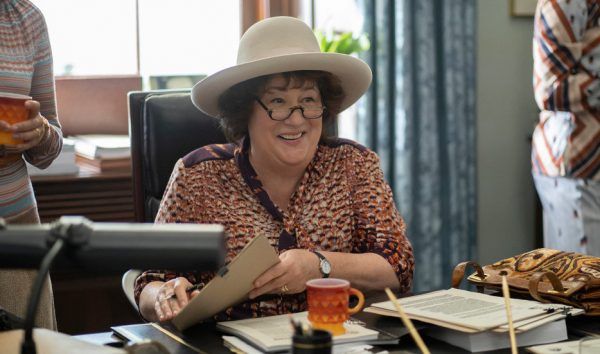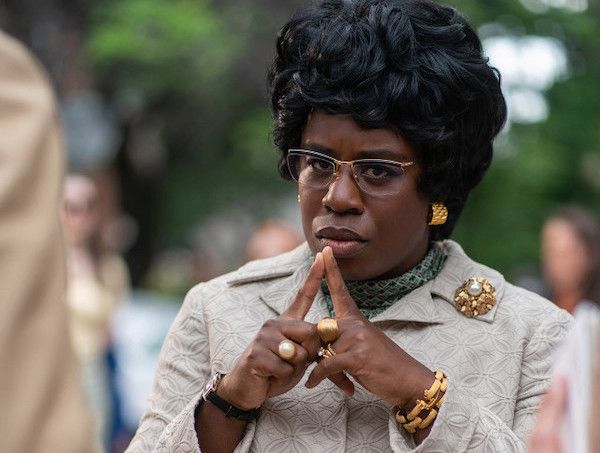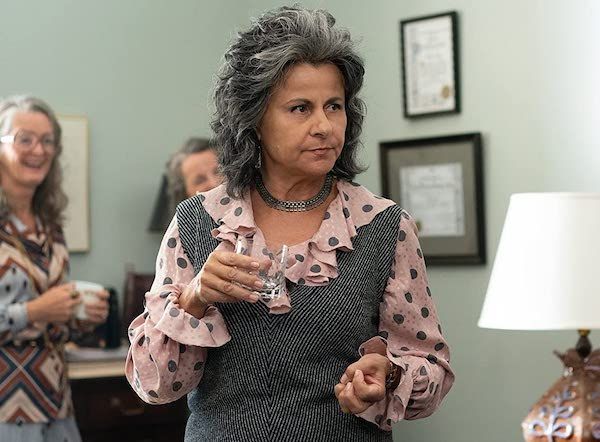Long before its April 15 premiere, FX's limited series Mrs. America was at the top of my personal "must-see TV in 2020" list. The cast is one of the most impeccable amongst this year's TV offerings, with Cate Blanchett as ostensible lead, Rose Byrne, Uzo Aduba, Margo Martindale, and Tracey Ullman, plus numerous other famous faces taking on supporting roles. The show focuses on the battle between the left and the right to ratify the Equal Right Amendment in the 1970s, a fight which has now become evergreen (spoiler alert: it's still not ratified) and still integral to modern-day feminist ideology. Even with these two enticing aspects in place, it might be tough to encourage viewers to sit down and watch Mrs. America, especially right now, in an election year. If you still need a reason to watch this series, let it be this: there is a willingness and readiness written into the fabric of Mrs. America to critique the shortcomings of second-wave feminism as much as its readiness to honor its successes which is necessary if we want to truly honor all of those who went before us to do this work.
There is an impulse, more often than not, to have historical TV dramas skew glossy, turning everything rose-colored unless explicitly stated otherwise. In the case of Mrs. America, it is clear from the outset while the show's focus is on the ideological and political fight to ratify the ERA, measures will be taken to investigate the women engaged in said fight, the psychology behind their behavior, and their actions. This means taking a hard look at the implications of the second wave led by a predominantly middle-class, white group of women whose faces landed on magazines, who made late-night talk show appearances, and who gave the soundbites to reporters as well as the women who may not have been middle-class, white, straight who felt they needed to unwaveringly support the face of the movement, sometimes at their own expense. Feminism is not a monolith and engaging with it is not a universal experience, Mrs. America reminds us, revealing itself to be a more complex examination of the pros and cons of the women's liberation movement than the marketing campaigns may have suggested.
In reality, feminism has never been a monolith. Movement-making events like the Seneca Falls Convention and the 19th Amendment's ratification may have happened more than a century ago, but the American iteration of feminism as active political movement is still a nascent, too. There has been no PR campaign or slogan or one-size-fits-all solution which has accounted for every person who aligns themselves with the political feminist movement and its tenets. Mrs. America's prevailing message in this first handful of episodes appears to be this: For every hard-won step forward feminism as a political movement has made, there have been numerous unspoken trade-offs and tough compromises made at the expense of certain groups within the movement. If that doesn't make you sit up a bit straighter and want to tune in right now, well. f
We're four episodes in and Mrs. America has taken to task the second wave's broad strokes attitudes toward race and sexuality within the movement. It became clear Mrs. America wasn't pulling punches by Episode 3, "Shirley." The primary arc focuses on Shirley Chisholm's (Aduba) campaign to secure the Democratic nomination for president. Mrs. America's Shirley must grapple with the uncomfortable side of liberal politics. As folks gather for the 1972 Democratic National Convention, Shirley is warned about appearing too openly feminist to secure black votes. It's also made clear to her by Bella Abzug (Martindale) that, despite her history-making run at the Democratic nomination which seems to be a win for women everywhere, she simply won't get the delegates needed to secure the nomination and she should just roll over and open the pathway for George McGovern, an older white male, to get the nomination instead. "It's the right idea, but not good right now" is the attitude Mrs. America telegraphs to us. It's the right idea for a black woman to run for the Democratic nom, but not right now when the movement as a whole needs to ratify the ERA. The show encourages us to respond with, "If not now, when?"— a sharp refrain you find yourself saying as you watch.
Mrs. America doesn't hold back when getting down to the tricky internal dynamics of the second wave. In Episode 4, "Betty," a Ms. magazine pitch meeting becomes ground zero for white women being (rightfully) forced to confront their own liberal attitudes. The meeting looks like a dream workplace situation: A ring of working women, one of them nursing their infant, pitching stories on pressing issues of the day. But when Gloria Steinem (Byrne), magazine founder and the most recognizable face of the second wave, turns to Margaret Sloan (Bria Henderson), a new hire at Ms. and black, gay, single mom, for a pitch and she offers a piece addressing tokenism in the workplace in regards to black employees, a tenseness settles over the group. Suddenly, a group of middle-class white women are forced to confront a blind spot in their perception of racial dynamics and immediately turn passive-aggressive. Even though it goes unsaid, we know Margaret's pitch won't be approved because it would be too confrontational to Ms. readers, however valuable it may be.
Discussions around sexuality are also addressed on Mrs. America, especially in Episode 4. The queer female contingent of the second-wave, who in reality identified as the Lavender Menace, are referred to in hushed tones on Mrs. America. Whispers about Betty Friedan's (Ullman) public anti-lesbian comments and the need to suppress lesbians just as publicly desiring support by their straight female sisters-in-arms populate side conversations. Yes, we expect the snide remarks from Blanchett's Phyllis Schlafly about the so-called moral corruptness of queer women, but Mrs. America also wants to remind us the second wave wasn't as intersectional as we may be tempted to romanticize it. While racial inequality was very much a valid issue in need of addressing, America's understanding of human sexuality and queer identities was still very much in its infancy, especially in the political arena. As such, the show's depiction of the limited attitudes of liberal women leading the movement and their readiness to shun any woman who dared to publicly advocate for queer female liberation is deeply necessary; there are no free passes when Mrs. America remembers.
The critical lens Mrs. America puts on second-wave feminism amidst celebrating the movement's wins is exactly the reason you need to be watching. Feminism is an ever-evolving movement, one which demands an intersectional mindset be fully integrated into the movement's consciousness. Mrs. America reminding us this was not always so and making space to then unpack that alongside its remembrances of the hard-won minor victories the second wave achieved makes this show all the stronger. We should be hoping our art to challenge our remembrance of history. We should be embracing art which serves up tough love by the spoonful, confronts the privileged viewer with reality, and takes time to present numerous aspects of what we know to be complicated (even if we're not ready, not in agreement, etc.). Creating a show where we deify those who went before us and led the feminist movement without having the tough conversations simmering underneath the surface would have made Mrs. America feel like a hollow, flashy exercise in dramatizing history. Instead, Mrs. America's extremely honest, warts-and-all look back at the highs and lows of the second wave make a strong case for why you need to catch up on this show ASAP and see it through to its conclusion.
Mrs. America releases new episodes every Wednesday on Hulu through May 27. For more, why not check out our round-up of the best Hulu shows you can binge watch right now?





